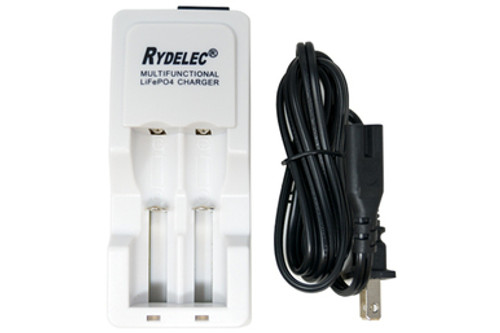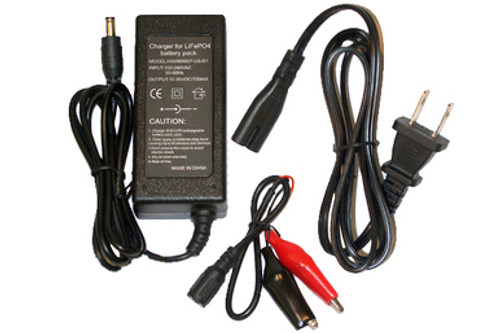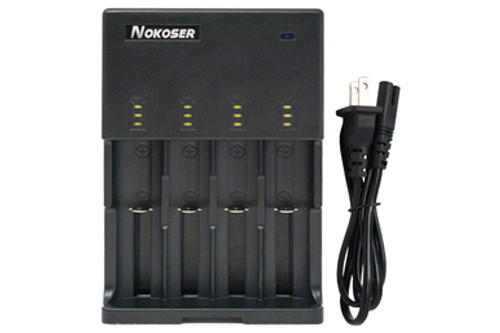LiFePO4
-

-

-

Rydelec
Lithium Phosphate Charger for 3.2 Volt Batteries (14430, 14505, 18500 & 18650)
$46.19As low as: -

-

-

-

-

Nokoser
Nokoser 4 Slot Smart Charger for 3.2 Volt LiFePO4, 3.7 Volt Li-Ion, NiCd & NiMH Batteries
$64.29As low as: -

Rydelec
T4 4 Slot Smart Charger for 3.2V LiFePO4, 3.7V Li-Ion, NiCd & NiMH Batteries
$64.29As low as: -

-

LIFEPO4 BATTERY CHARGERS
The Ultimate Guide to LiFePO4 Battery Chargers: Everything You Need to Know
Lithium Iron Phosphate (LiFePO4) batteries are revolutionizing energy storage and power solutions across industries. With their remarkable energy density, longevity, and safety, these batteries have become the go-to choice for applications ranging from electric vehicles to solar energy storage systems. However, to unlock the full potential of LiFePO4 batteries, using the right charger is essential.
Understanding LiFePO4 Batteries
Chemistry and Advantages
LiFePO4 batteries belong to the lithium-ion battery family, but their unique chemistry sets them apart. Comprising a lithium iron phosphate cathode, these batteries offer:
High Energy Density: They provide significant power output in a compact form.
Long Cycle Life: Capable of thousands of charge/discharge cycles, LiFePO4 batteries outlast traditional lead-acid and other lithium-ion chemistries.
Enhanced Safety: The thermal and chemical stability of LiFePO4 minimizes risks of overheating, combustion, or explosion.
Eco-Friendliness: Unlike other lithium chemistries, LiFePO4 batteries contain no harmful metals like cobalt, making them environmentally sustainable.
Applications
The versatility of LiFePO4 batteries has made them indispensable in various sectors:
Electric Vehicles (EVs): For powering cars, scooters, and bikes.
Renewable Energy Storage: Used in solar and wind energy systems.
Backup Power: Ideal for uninterruptible power supplies (UPS) and emergency systems.
Portable Electronics: Powers drones, portable medical devices, and high-performance tools.
Given their advantages, the importance of properly charging LiFePO4 batteries to maintain their performance cannot be overstated.
Choosing the Right LiFePO4 Battery Charger
Selecting the correct charger for your LiFePO4 battery is crucial to ensure efficiency, safety, and longevity. Here’s what to consider:
1. Voltage Matching
LiFePO4 batteries typically operate at specific nominal voltages, such as 3.2V, 9.6V, or 12.8V. Ensure that the charger you choose matches the battery's voltage to prevent undercharging or overcharging. For example:
A 12.8V battery requires a charger with a 14.6V maximum output (recommended charging voltage).
2. Charging Current
The charger’s output current, measured in amps, determines how quickly your battery charges. Choose a charger that provides a suitable current without exceeding the battery’s maximum charge rate. A general rule is to charge at a rate of 0.5C to 1C (where C represents the battery’s capacity in ampere-hours).
3. Charging Mode
LiFePO4 batteries require a constant current/constant voltage (CC/CV) charging mode:
Constant Current (CC): The charger delivers a consistent current until the battery reaches a specific voltage.
Constant Voltage (CV): The charger maintains a constant voltage while the current gradually tapers off as the battery nears full charge.
4. Safety Features
Safety is paramount when dealing with high-energy batteries. Look for chargers with:
Overcharge Protection: Stops charging once the battery is fully charged.
Temperature Monitoring: Prevents overheating by shutting down if temperatures exceed safe limits.
Short-Circuit and Reverse Polarity Protection: Ensures safe operation in case of connection errors.
Key Features and Benefits of LiFePO4 Battery Chargers
Modern LiFePO4 chargers come equipped with features designed for convenience, performance, and safety:
1. Smart Charging Technology
Microprocessor-controlled chargers analyze battery conditions and adjust charging parameters dynamically, ensuring optimal charging performance without user intervention.
2. LED Indicators
Clear, intuitive LED or LCD displays provide real-time information about charging status, battery health, and potential issues.
3. Comprehensive Protection Mechanisms
High-quality chargers include multiple layers of protection, such as surge protection, undervoltage lockout, and fault detection, ensuring the safety of both the battery and the charger.
4. Portability and Design
Compact and lightweight chargers are ideal for on-the-go applications, while rugged designs are suited for industrial and outdoor use.
Compatibility and Versatility
LiFePO4 chargers are versatile and compatible with a wide range of battery configurations:
Battery Pack Configurations
From single cells (3.2V) to multi-cell packs (9.6V, 12.8V, and beyond), LiFePO4 chargers cater to various needs. Ensure that the charger’s voltage and current outputs align with your battery pack’s specifications.
Connector Options
Modern chargers come with a variety of connector types, such as:
Anderson Connectors: Popular for high-current applications.
Alligator Clips: Simple and versatile.
Barrel Plugs: Common in consumer-grade chargers.
Adapter Compatibility
Some chargers support interchangeable adapters, enabling compatibility with different battery brands and models.
Tips for Optimal Charging Performance
To maximize the lifespan and performance of your LiFePO4 batteries, follow these best practices:
1. Maintain Proper Charging Frequency
Avoid leaving your batteries fully discharged for extended periods. Charge them as soon as possible after use to prevent capacity loss.
2. Monitor Charge/Discharge Cycles
Track the number of cycles your battery has completed. While LiFePO4 batteries have long lifespans, adhering to their recommended cycle limits ensures consistent performance.
3. Store Batteries Properly
When not in use, store batteries in a cool, dry place at around 50% state of charge. Avoid extreme temperatures, which can degrade battery chemistry.
4. Use the Right Charger
Always use a charger specifically designed for LiFePO4 batteries. Generic lithium-ion chargers may not have the correct voltage or safety features required for LiFePO4 chemistry.
5. Avoid Overcharging and Deep Discharging
Overcharging and deep discharging can damage the battery and shorten its lifespan. A good charger will prevent these conditions automatically.
LiFePO4 battery chargers are indispensable tools for ensuring the safe, efficient, and long-lasting performance of your batteries. By understanding the unique requirements of LiFePO4 chemistry and choosing a charger with the right features, you can maximize your battery’s potential.
Investing in a quality charger with smart technology, safety mechanisms, and compatibility options is a small price to pay for the benefits of extended battery life, enhanced safety, and reliable power. Whether you’re powering an electric vehicle, storing renewable energy, or simply running portable devices, a LiFePO4 charger is your key to a seamless energy solution.
Charge smarter and enjoy the unmatched advantages of LiFePO4 batteries with the right tools in your arsenal.

